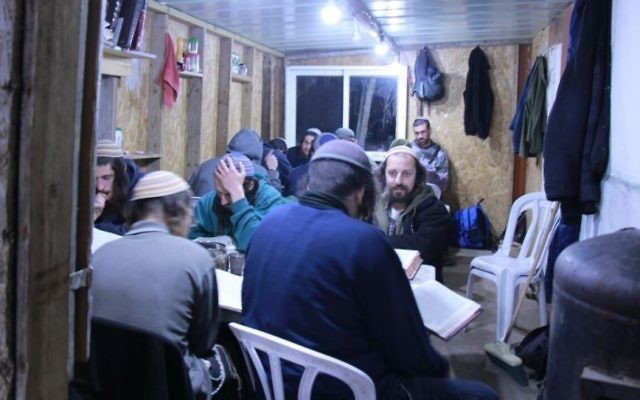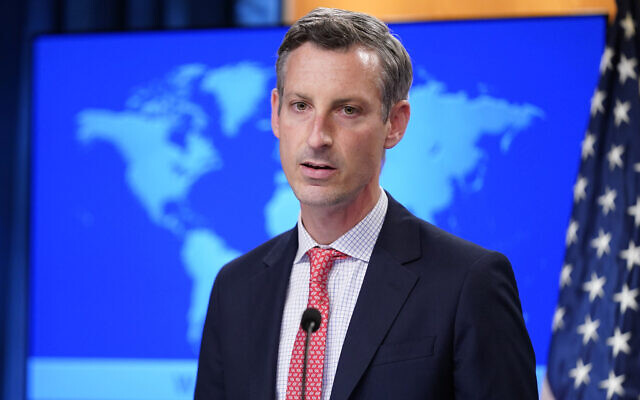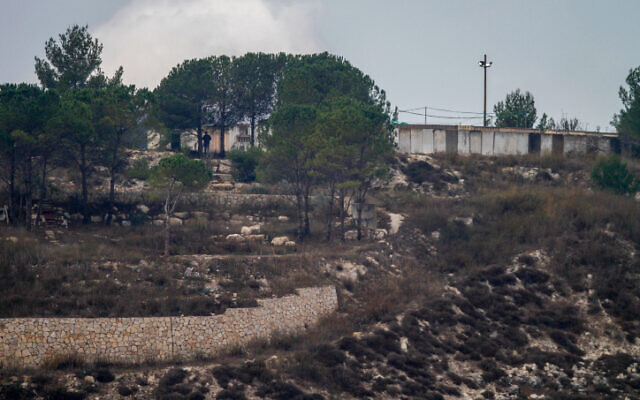State Department spokesman says administration’s stance against unilateral steps ‘certainly’ includes Israeli government’s effort to legalize Homesh in northern West Bank
By JACOB MAGID Today

Yeshivat Homesh students pictured in their study hall that lies on top of the evacuated settlement of Homesh.
(Courtesy: Yeshivat Homesh)
US State Department spokesman Ned Price said Wednesday that the US opposes the new Israeli government’s efforts to legalize a wildcat settler outpost in the northern West Bank.
“Our call to refrain from unilateral steps certainly includes any decision to create a new settlement, to legalize outposts or allowing buildings of any kind deep in the West Bank adjacent Palestinian communities or on private Palestinian land,” Price said when asked about the Homesh outpost during a Wednesday press briefing.
The US has long spoken out against unilateral measures by Israeli and Palestinian governments deemed harmful to the prospects for a two-state solution, though decisions to weigh in on specific examples are more rare
Prime Minister Benjamin Netanyahu’s new government announced earlier this week that it intends to legalize Homesh, making it a recognized settlement.
While the international community considers all settlements illegal, Israel differentiates between settlement homes built and permitted by the Defense Ministry on land owned by the state, and illegal outposts built without necessary permits, often on private Palestinian land. However, outposts are sometimes erected with the state’s tacit approval, and successive governments have sought to legalize at least some of the unrecognized neighborhoods as a result.
US State Department spokesman Ned Price said Wednesday that the US opposes the new Israeli government’s efforts to legalize a wildcat settler outpost in the northern West Bank.
“Our call to refrain from unilateral steps certainly includes any decision to create a new settlement, to legalize outposts or allowing buildings of any kind deep in the West Bank adjacent Palestinian communities or on private Palestinian land,” Price said when asked about the Homesh outpost during a Wednesday press briefing.
The US has long spoken out against unilateral measures by Israeli and Palestinian governments deemed harmful to the prospects for a two-state solution, though decisions to weigh in on specific examples are more rare
Prime Minister Benjamin Netanyahu’s new government announced earlier this week that it intends to legalize Homesh, making it a recognized settlement.
While the international community considers all settlements illegal, Israel differentiates between settlement homes built and permitted by the Defense Ministry on land owned by the state, and illegal outposts built without necessary permits, often on private Palestinian land. However, outposts are sometimes erected with the state’s tacit approval, and successive governments have sought to legalize at least some of the unrecognized neighborhoods as a result.
“The Homesh outpost in the West Bank is illegal. It is illegal even under Israeli law,” Price said.
Homesh largely consists of several makeshift buildings that have been used to house a yeshiva that was established on the grounds of the settlement that was razed in 2005 as part of Israel’s settlement withdrawal from the Gaza Strip.
Homesh largely consists of several makeshift buildings that have been used to house a yeshiva that was established on the grounds of the settlement that was razed in 2005 as part of Israel’s settlement withdrawal from the Gaza Strip.

US State Department spokesperson Ned Price speaks during a briefing at the State Department in Washington, November 2, 2022. (AP Photo/Susan Walsh, File)
A law passed ahead of the so-called disengagement barred Israeli civilian presence at Homesh and three other northern West Bank settlements that were evacuated at the time, but the law has rarely been enforced, allowing ultra-nationalist settlers to trek up the hilltop every day for yeshiva studies.
The High Court of Justice ruled that the yeshiva sits on private Palestinian property, but farmers from the neighboring village of Burqa have been barred from accessing their lands there.
Homesh returned to national headlines in December 2021 when Palestinian gunmen opened fire on yeshiva students descending from the hilltop, killing one. Settler leaders demanded the government legalize the outpost in response to the terror attack.
The Yesh Din rights group petitioned the High Court of Justice demanding that the illegal yeshiva at Homesh be removed and the Palestinian residents of Burqa be given access to their private land on which the yeshiva sits.
Last May, under the Bennett-Lapid government, the state acknowledged in response to the Yesh Din petition that Homesh was illegal and informed the High Court it would evacuate the outpost, though it did not set a date for enforcement amid pressure from right-wing members of the coalition.
(Nasser Ishtayeh/Flash90)
The court ordered the state in June to report back within two months on the steps it was taking to evacuate and demolish the outpost, but the government collapsed and Prime Minister Benjamin Netanyahu’s right-wing, religious coalition, which is ideologically committed to expanding the settlements, took office.
On Monday, the government informed the High Court that it had made the decision to legalize Homesh instead of evacuating it, by repealing part of the 2015 disengagement law.
The High Court then demanded the government explain why the illegal settlement should not be evacuated. The court also demanded the government explain why it should not take the necessary steps to grant the Palestinian landowners regular access to their land, something they have been systematically denied for years, due to the presence of the outpost and restrictions imposed by the IDF.
The court ordered the state in June to report back within two months on the steps it was taking to evacuate and demolish the outpost, but the government collapsed and Prime Minister Benjamin Netanyahu’s right-wing, religious coalition, which is ideologically committed to expanding the settlements, took office.
On Monday, the government informed the High Court that it had made the decision to legalize Homesh instead of evacuating it, by repealing part of the 2015 disengagement law.
The High Court then demanded the government explain why the illegal settlement should not be evacuated. The court also demanded the government explain why it should not take the necessary steps to grant the Palestinian landowners regular access to their land, something they have been systematically denied for years, due to the presence of the outpost and restrictions imposed by the IDF.

No comments:
Post a Comment